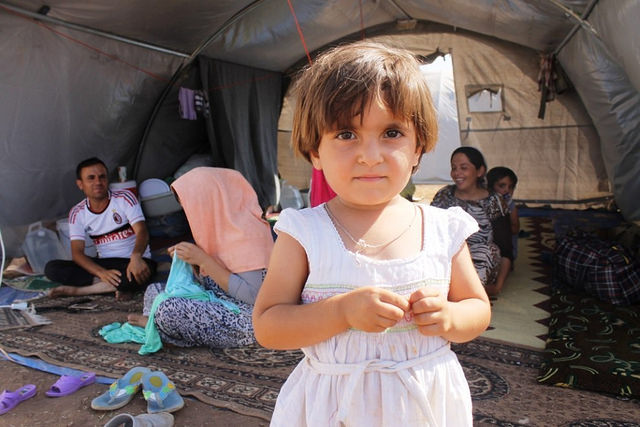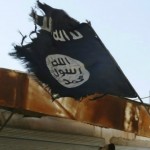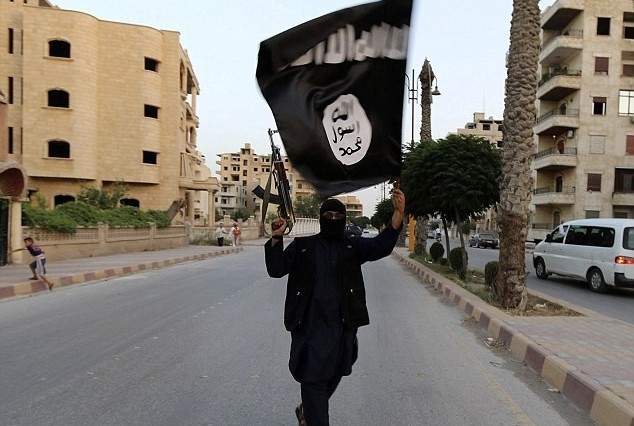by Jim Lobe
Despite rising criticism of his foreign policy — even from his former secretary of state — President Barack Obama’s decision last week to carry out airstrikes against Islamic State militants in northern Iraq enjoys relatively strong public support, at least so far.
Over half (54 percent) of respondents in a poll released here Monday by the Pew Research Center and USA Today said they approved of the airstrikes, which appear to have helped reverse some of the gains made by Islamic State fighters against Iraqi Kurdish peshmerga forces earlier this month.
The survey comes as the administration broadened its air campaign against suspected Islamic State targets in northern Iraq and rushed arms and other supplies to US-trained Iraq special forces units and the peshmerga.
Thirty-one percent said they disapproved of the strikes, while 15 percent of the 1,000 randomly selected respondents who took part in the survey, which was carried out between Thursday and Sunday, declined to give an opinion.
The poll found major partisan differences, with self-described Republicans markedly more hawkish than Democrats or independents, although a majority of Democratic respondents said they also supported the airstrikes.
However, a majority (57 percent) of Republicans said they were concerned that Obama was not prepared to go “far enough to stop” the Islamic State, while majorities of Democrats (62 percent) and independents (56 percent) said they worried that he may go too far in re-inserting the military into Iraq three years after the last US combat troops were withdrawn. Overall, 51 percent of respondents expressed the latter fear.
That concern was felt particularly strongly by younger respondents, members of the so-called “millennial” generation, whose foreign policy views have tended to be far more skeptical of the effectiveness of military force than those of other generational groups, according to a number of polls that have been released over the past two years.
Thus, while respondents over the age of 65 were roughly equally split between those who expressed concern about Obama doing too little or going too far, more than two-thirds of millennials said they were worried about the US becoming too involved in Iraq, while only 21 percent voiced the opposing view.
The survey comes as the administration broadened its air campaign against suspected Islamic State targets in northern Iraq and rushed arms and other supplies to US-trained Iraq special forces units and the peshmerga, whose forces proved unable to counter the Islamic State’s initial advances that took its forces to within 35kms of Erbil, Kurdistan’s capital.
When Obama last week announced Washington’s renewed intervention in Iraq, he stressed its limited aims: to protect Iraqi minorities, notably thousands of Yazidis besieged by the Islamic State on the slopes of Sinjar, against “genocide”, and Erbil, where the US has a consulate and hundreds of personnel, including dozens of military advisers, part of a much larger contingent dispatched to Iraq in June.
Obama also said Washington intended to protect “critical infrastructure” in the region, which he did not define further at the time. In a letter to Congress released Sunday, however, he declared that the Islamic State’s control of the strategic Mosul dam, which is Iraq’s largest and supplies much of the country with water and electricity, constituted a threat to the US Embassy in Baghdad.
“The failure of the Mosul Dam could threaten the lives of large numbers of civilians, endanger U.S. personnel and facilities, including the U.S. Embassy in Baghdad, and prevent the Iraqi government from providing critical services to the Iraqi populace,” the letter asserted.
Indeed, US warplanes and unmanned aircraft, operating in co-ordination with the peshmerga and Iraqi special forces, repeatedly struck Islamic State positions there in the last few days. By Monday evening, the peshmerga and Iraqi government forces said they had successfully retaken the dam.
The initial success of the US air campaign — 68 airstrikes have been carried out to date, according to Washington’s Central Command (CentCom) — follows Thursday’s resignation of Prime Minister Nouri al-Maliki, a critical step, in the administration’s view, toward establishing a less-sectarian government capable of reaching out to disaffected Sunnis who have joined or cooperated with the Islamic State without necessarily sharing the group’s extreme and violent ideology.
Obama has long insisted that U.S. military assistance to Baghdad would be calibrated according to the degree to which its Shia-led government was willing to compromise with the Sunni and Kurdish minorities.
US pressure helped persuade Maliki to step down in favor of Haider al-Abadi, a fellow-Shia and Dawa party leader who Washington hopes will be more willing to share power with both Sunnis and Kurds.
But experts here give as much or more credit to Iran in pushing forward Maliki’s replacement.
The initial success of both Obama’s military intervention and his role in removing Maliki will likely help counter the steadily accumulating chorus of attacks — mostly by neoconservatives and Republicans — on his foreign policy prowess.
Even some in his own party, including, most recently, his former secretary of state and the presumptive 2016 Democratic presidential nominee, Hillary Clinton, have complained that he should have provided more support to “moderate” factions in Syria’s insurgency earlier in that country’s civil war and that he was too passive for too long in responding to the Islamic State’s advances in al-Anbar province earlier this year.
But the latest survey, as most others released over the past year, suggest that Obama’s caution reflects the public mood, and especially the sentiments of younger voters, as well as the Democratic Party’s core constituencies.
In addition to asking whether they feared Obama would either do too much or too little in countering the Islamic State in Iraq, the pollsters asked respondents whether they thought the “U.S. has a responsibility to do something about the violence in Iraq.”
Overall, 44 percent answered affirmatively, while 41 percent said no, and 15 percent said they didn’t know.
Those results marked a major change from when the same question was posed in July. At that time 39 percent said yes, but a 55-percent majority answered in the negative, and six percent said they didn’t know.
While the change may be attributed to the sense of increased threat posed by the Islamic State to the US itself, much of the news media coverage since the beginning of August focused on the plight of minority communities, especially Christians and Yazidis, threatened by the Islamic State’s latest campaign.
The percentage of respondents who believe the US has a responsibility to take action in Iraq is significantly higher than the percentages that took the same position when the US intervened in Libya and when Obama said he was prepared to conduct military action against Syria after the chemical attacks.
Detailed surveys about foreign policy attitudes conducted over the past decade have suggested that US respondents are most likely to favor unilateral military action in cases where it could prevent genocide or mass killings.
Photo: An Iraqi refugee with her family at the Nawroz camp where they are being helped by the International Rescue Committee. Credit: Rachel Unkovic/International Rescue Committee
This article was first published by IPS News and was reprinted here with permission.






1,000 out of 350 Million, goodness, and then, there’s the MSM version of the P.R. out of the Administration. Not knowing the questions asked, and not knowing exactly what the targets & the destruction of same were, it’s hard to believe there was any positive advantage to the U.S.Military bombing or what ever it was they did. Reading other sources concerning the situation in Iraq, the waters are so muddy, that there isn’t any clear picture to be seen. Depending on who one reads, the consensus points to the biggest blunder so far this young century, one that puts the world on the edge of Armageddon. The only ones who are whole, are the M.I.C. & the Bankers financing the wars. Everybody else is on the losing side, especially the American taxpayer, who I might add, is bearing the burden more and more, as the Government lets the “big businesses off the hook. Perhaps the N.Y.Fed is shipping more pallet loads of $100.00 bills, like they did when Brenner was the “ruler” of Iraq.
While I agree with Norman’s questioning of the size of the poll – 1,000 – and just how representative such a sample is, it seems that Obama has got it just about right, based on the expressed opinions across the political spectrum.
This exercise has also proved the unsuitedness of Hilary Clinton to take on the role of President of the US, does it not, as she is far too short-termist in outlook?
Obama has – wisely – kept US involvement in Iraq to the effective minimum required.
Why expend – and waste – valuable resources when you do not have to?
As for Syria, it is time for the US to negotiate with Assad to assure defeat of the Islamic State.
The reason for the support of the American people for the bombing in the Kirkuk area was because Empire propaganda media made their usual “humanitarian” play as to the suffering of the Yazidis, “trapped” in the mountains who would surely die without American help.
Of course this was really about Exxon’s lost oil fields and the fact that the downside of a foreign policy, of using Jihadhis as quasi human weapons of mass destruction for under the radar wars, is that when they get their hands on oil fields and independent financing, it becomes Washington’s Frankenstein monster running amok time
That is what happened in Libya and is now happening with ISIS.As Empire is redrawing the map of the Levant, Iraq’s oil is supposed to be exploited by Exxon in what will be a quasi independent Kurdistan that will be a protectorate of Ankara.
Crazy Jihadhis, while useful have to get back on their leash. Notice Empire has not made air strikes in support of the Iraqi army trying to take Tikrit back. That all has to do with the evolving new relationship between Empire and Khamenei as to how Iran will position itself in Cold War 2 that the Obamanation has declared against Russia and China.